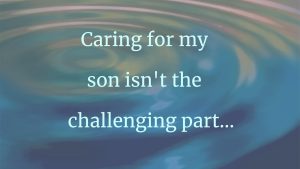Jessica Greenberg ~
“Code Blue, Interventional Radiology suite,” blare the overhead speakers.
I am a new third-year medical student, doing my first rotation in internal medicine at Yale New Haven Hospital. This morning, I’ve been rounding on patients with my medical team.
The alarm sends us lumbering down the halls, struggling to keep our clogs from falling off our feet, clutching our white jackets to our chests to keep the pockets full of stethoscopes and pens and patient lists from bouncing.
Arriving in the IR suite, I stop about twenty feet from the middle-aged woman lying in the patient bed. More than a dozen physicians and nurses crowd around her, obscuring my view.
“She came for a nephrostomy-tube placement to help her obstructed kidney drain. Then she suddenly went into cardiac arrest,” says an intern standing nearby.
Fleetingly, I imagine myself in this woman’s place–coming in for a garden-variety procedure, only to plunge into a life-or-death medical catastrophe. Surely she didn’t know that this was in store, I think. Did she have plans for later in the day?
“This is a circus!” screams a young woman–the patient’s daughter, I assume. She’s been shepherded over to the side by a security guard. “This is a damn circus! This isn’t right!” She repeats it over and over, with growing intensity and panic.
“They’re doing their best. They know what they’re doing,” the security officer says, placing a reassuring hand on her arm.
It sort of is a circus, I think. But I’ve never seen a code before, so what do I know?
I want to get closer to see what’s going on, but at the same time, I’m not sure that I can process any more information. My resident is doing chest compressions, heaving his body weight through locked elbows and hands on the patient’s sternum. People are running around trying to find the supplies they need. I want to help, but I can’t. I have no authority and little training.
Urgent commands ring out over the coordinated commotion: “EKG stat! Chest X-ray!” A physician analyzes the defibrillator rhythm. A timekeeper calls out for a pulse check and another dose of medication every three minutes, nurses force extra IVs into collapsed veins, and more physicians and nurses hover in the background, ready to relieve the person doing compressions.
Amid the chaos, the doctor leading the code seems heroically calm. She checks in with each participant and guides everyone like a conductor directing an orchestra, keeping everyone in sync.
Will I ever be as confident in my knowledge and command of the situation at hand? I wonder.
It’s been ten minutes. Cautiously, the security guard escorts the patient’s daughter closer to the bedside, so that she can more easily see her mother. I move a few steps closer myself.
From here, I have a better view of the woman in the bed, who appears sporadically between the flaps of white coats surrounding her. Her arms are limp and jump up with each compression. Dark bruises mottle her chest. Bright red blood from the nephrostomy incisions has soaked the white sheet beneath her, and blood is oozing from her nose and bubbling up from her lungs.
”I think we should call the code,” the leader says. “Any objections?”
Some staff look knowingly at each other, others look down in acquiescence. No one speaks.
The daughter slaps herself in the forehead.
“No! No! No!” she shouts. Slap. Slap. Slap. With each shout she gives herself another smack.
Without explicit orders, the team dutifully resumes compressions. Their motions are identical, but their sense of futility is clear.
At the end of that cycle, the leader asserts, “I really think we should call the code now.”
“No! No! No!” screeches the patient’s daughter. Again, she beats her forehead, her legs buckling beneath her, then starts to fall forward. The security guard grabs her shoulders to keep her upright.
“Time of…” the leader hesitates and then almost whispers: “…death, 1:04 pm.”
A quiet whimper from the young woman: “No, no, no….”
A nurse brings her a chair, but she resists the staff’s gentle efforts to get her to sit down.
I feel for her. I wonder if bearing witness to her mother’s care will help her to grieve or make it harder. I wonder if she has family with whom she can share the loss. I am grateful for the experienced staff’s efforts to soothe her.
“Wait! Wait! I think I feel a pulse!” a nurse calls.
A pause. All eyes turn to the leader.
“Please check carefully,” she says firmly.
He does.
“Yes, it’s there.”
More orders are called, but the mayhem has subsided. The room empties except for a few essential caretakers who will manage the patient until she’s sent to the medical ICU. The rest of us depart to resume our previous activities.
As my resident and I walk to the elevators, I struggle to quiet my racing mind. I feel a need to acknowledge the immensity of our shared experience. I turn to my resident, who has not said a word.
“How do you feel?” I ask. He looks at me quizzically.
“I mean, do you feel good? You helped bring her heart back.” I choose my words carefully, making sure not to say “You saved her.”
Although I want him to nod–to affirm that, despite the woman’s agony and the injuries we inflicted, our lifesaving efforts were worthwhile–I’ve seen enough at this point to brace myself for his answer.
He lowers his eyes and shakes his head.
“No, no,” he says quietly. “She bled so much, and we coded her for so long…I don’t think she’ll do well.”
About the author:
Jessica Greenberg is a fourth-year student at Yale School of Medicine, applying to residency in obstetrics and gynecology. In her free time she likes to go on outdoor adventures with her fiancé, seven-month-old son and dog Haruki (named for Japanese writer Haruki Murakami). Jessica has been interested in creative writing since middle school. She writes both fiction and nonfiction and uses writing to process challenging life events both inside and outside of medicine. “I wrote about this experience to mark its importance and to reflect on how the relentless and repetitive demands of the hospital environment can make it difficult for care providers to take in the enormity of what can be, for a patient, a major life event.”
Story editors:
Kristen Lee and Diane Guernsey








3 thoughts on “My First Code”
Am numb….Flash-backs of so many patients / residents
clients…..(and some how they’re still with me….) never
to be erased…. Hopefully I did the best I could….
hopefully I helped to ease the pain and said the right
silent prayer to ease them in to the next journey……
Well done and well-written! I’m a long-retired firefighter/paramedic, and my first code was under a kitchen table. “That’s it, I’m quitting,” I thought, as our patient was pronounced in the emergency room. Several days later, another failure. This time the patient was wedged between the toilet and the bathroom wall. Somehow, I managed another 18 years, and had a few “saves” along the way. I bet you will, too!
This morning rounds were interrupted to help with a code in the SICU. When our team arrived the code team had it under control. I asked the stunned medical student on service if he had ever attended a code. Never, he told me. Bravely, he donned a yellow gown to protect him from c.diff and blood. Standing patiently in line to take a turn at chest compressions.
15 minutes later time of death is recorded and 15 of us once so focused, are now supposed to turn it off.Instead of all that I hit the pause button for our team. We went into a conference room, took 30 seconds to breath and out loud acknowledge that someone just died and it was traumatic. Then I read this story. As an attending, I still flounder with how to emotionally debrief after bearing witness to loss. The power of narrative helps. Keep writing! It helps us all process.